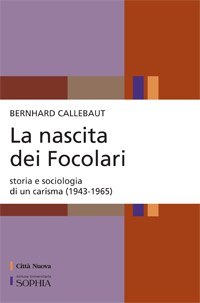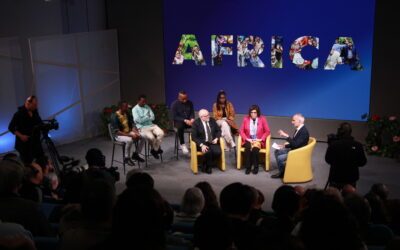 From a small city in northern Italy to five continents: an ample sociological dossier outlines the history of the Focolare, from its birth up to the definitive approval of the Church in 1965. It is a detailed reconstruction, encouraged by the founder of the Focolare herself already in the 1980s, and published for the first time in 2010 in a French edition, and lately translated into Italian by Città Nuova. Piero Coda, Rector of Sophia University Institute, introduces Callebaut’s study in the preface, with these words: “Up to today, there has never been an overall scientific approach to the history of the Focolare […] this current research for the first time constructs and institutes a historical and interpretative dossier of the important phenomenon represented by the Focolare Movement. […] The work is accurate, precise, and as thorough as can be […] exemplary and excellent under the historical profile.” Interviewed by Lorenzo Prezzi for settimananews.it, Bernhard Callebaut (Bruges, 1953) explained the sense of the book: ”I think that the purely testimonial narration, in which the person is strongly felt, is always valid. I think that a book like mine could cancel from my story the beneficial shock experienced in the reading of some pages of Lubich’s first (Meditations) pages that stimulated the actualisation of the messages they contained. On this premise, I think that at a second moment, we have to respect the need to understand, contextualize, link the phenomenon in itself to a previous story and gather some of the future prospects.” With studies in law, philosophy and sociology at the Catholic University of Lovanio, Bernhard Callebaut is currently a professor at Sophia University Institute in Florence, of which he is also Program Director of the Religions in a Global World research group.
From a small city in northern Italy to five continents: an ample sociological dossier outlines the history of the Focolare, from its birth up to the definitive approval of the Church in 1965. It is a detailed reconstruction, encouraged by the founder of the Focolare herself already in the 1980s, and published for the first time in 2010 in a French edition, and lately translated into Italian by Città Nuova. Piero Coda, Rector of Sophia University Institute, introduces Callebaut’s study in the preface, with these words: “Up to today, there has never been an overall scientific approach to the history of the Focolare […] this current research for the first time constructs and institutes a historical and interpretative dossier of the important phenomenon represented by the Focolare Movement. […] The work is accurate, precise, and as thorough as can be […] exemplary and excellent under the historical profile.” Interviewed by Lorenzo Prezzi for settimananews.it, Bernhard Callebaut (Bruges, 1953) explained the sense of the book: ”I think that the purely testimonial narration, in which the person is strongly felt, is always valid. I think that a book like mine could cancel from my story the beneficial shock experienced in the reading of some pages of Lubich’s first (Meditations) pages that stimulated the actualisation of the messages they contained. On this premise, I think that at a second moment, we have to respect the need to understand, contextualize, link the phenomenon in itself to a previous story and gather some of the future prospects.” With studies in law, philosophy and sociology at the Catholic University of Lovanio, Bernhard Callebaut is currently a professor at Sophia University Institute in Florence, of which he is also Program Director of the Religions in a Global World research group.  The first 20 years of the history of the Focolare are fathomed starting from the “enlightenments” of Chiara Lubich, which later became the core of her spirituality. “The charism is always granted to someone in particular, also here,” Callebaut explains. “Only after a certain time, Lubich realised that actually that gift had been bestowed on her and nobody else, at least, not in such a strong, limpid and overwhelming manner. But with time, she realized that also her first companions, who were sent elsewhere – first to Italy, then Europe and the continents – also became in some way, harbingers, multipliers of the charism, ’springs’ in turn. As of today – and in my book it is amply demonstrated – the core of Lubich’s charism is linked to having identified – as a gift – and later developed, and as never before in the two millenniums of Christian life, the meaning of that apex of the passion that constitutes the moment of that cry of abandonment of Man-God.” The history of the Focolare at the start of the story is made up also of a long and suffered wait for the formal recognition of the Church. “At the start of the 1950s the Holy Office examined the papers on the Focolare and initiated a series of meetings with the young founder. To put her and her followers to the test and measure their faithfulness to the Church, they asked her to take a step back, and no longer act as head of the Movement. Her followers would have never hidden who was really the soul of the Movement and there was no leadership crisis during those years, until Paul VI definitively resolved the issue. In 1965 Lubich signed her first letter as president of the Focolare. Today, after a certain time, we are beginning to see that behind her stature as a bearer of spirituality, there was also a rather unusual density of thought.” In more recent years, the charismatic intuition of the founder translates also into a series of concrete proposals as a contribution to the resolution of social and cultural issues. Some of these were Economy of Communion, “which actuates the preferential choice for the poor, and at the same time, values those who are able to contribute to economical life with the not common talent of entrepreneurship,” or the founding of the Sophia Institute, “as an interesting contribution to the debates and ordeals of contemporary thought.” Today, all the members of the Focolare, in some way bring ahead and multiply the charism of Chiara Lubich to fulfill the prayer of Jesus: ‘that all may be one’. And Callebaut concludes: “We need to continue working for some centuries more, it seems.”
The first 20 years of the history of the Focolare are fathomed starting from the “enlightenments” of Chiara Lubich, which later became the core of her spirituality. “The charism is always granted to someone in particular, also here,” Callebaut explains. “Only after a certain time, Lubich realised that actually that gift had been bestowed on her and nobody else, at least, not in such a strong, limpid and overwhelming manner. But with time, she realized that also her first companions, who were sent elsewhere – first to Italy, then Europe and the continents – also became in some way, harbingers, multipliers of the charism, ’springs’ in turn. As of today – and in my book it is amply demonstrated – the core of Lubich’s charism is linked to having identified – as a gift – and later developed, and as never before in the two millenniums of Christian life, the meaning of that apex of the passion that constitutes the moment of that cry of abandonment of Man-God.” The history of the Focolare at the start of the story is made up also of a long and suffered wait for the formal recognition of the Church. “At the start of the 1950s the Holy Office examined the papers on the Focolare and initiated a series of meetings with the young founder. To put her and her followers to the test and measure their faithfulness to the Church, they asked her to take a step back, and no longer act as head of the Movement. Her followers would have never hidden who was really the soul of the Movement and there was no leadership crisis during those years, until Paul VI definitively resolved the issue. In 1965 Lubich signed her first letter as president of the Focolare. Today, after a certain time, we are beginning to see that behind her stature as a bearer of spirituality, there was also a rather unusual density of thought.” In more recent years, the charismatic intuition of the founder translates also into a series of concrete proposals as a contribution to the resolution of social and cultural issues. Some of these were Economy of Communion, “which actuates the preferential choice for the poor, and at the same time, values those who are able to contribute to economical life with the not common talent of entrepreneurship,” or the founding of the Sophia Institute, “as an interesting contribution to the debates and ordeals of contemporary thought.” Today, all the members of the Focolare, in some way bring ahead and multiply the charism of Chiara Lubich to fulfill the prayer of Jesus: ‘that all may be one’. And Callebaut concludes: “We need to continue working for some centuries more, it seems.”
 Callebaut Bernhard, Tradition, charisme et prophétie dans le Mouvement international des Focolari. Analyse sociologique, Paris, Nouvelle Cité, 2010, LXXXIII + 537 p. Italian translation La nascita dei Focolari. Storia e sociologia di un carisma (1943-1965), New City – Sophia, Rome 2017, p. 640. Entire interview by Lorenzo Prezzi
Callebaut Bernhard, Tradition, charisme et prophétie dans le Mouvement international des Focolari. Analyse sociologique, Paris, Nouvelle Cité, 2010, LXXXIII + 537 p. Italian translation La nascita dei Focolari. Storia e sociologia di un carisma (1943-1965), New City – Sophia, Rome 2017, p. 640. Entire interview by Lorenzo Prezzi




0 Comments